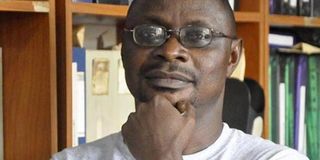What’s the state of politics and security in our region?

Asuman Bisiika
What you need to know:
- The dilemma. The first reaction in form of an air reconnaissance was dispatched at 7am the next day.
- That means Tanzanian troops defended themselves for more than 12 hours against what is rumoured to have been sophisticated weaponry.
On December 12, Parliament of Uganda resumed its business after a recess of more than a month. The recess was to enable MPs consult constituents on a Constitutional Amendment Bill seeking removal of the 35 and 75 age limits for a presidential candidate. The amendment is very unpopular. The principal beneficiary (and driver) for this amendment is known to me. This Bill is not even about Uganda; it is about him or her.
So, when Parliament resumed business, anxiety was palpable because the public expected Parliament to discuss a report of the parliamentary committee on the said Bill. On the same day, President Pierre Nkurunziza of Burundi launched a process that will culminate into the amendment of the Burundi Constitution. Nkurunziza is pushing for constitutional amendments whose adoption and passing will allow him run for office in the next presidential elections.
I personally rallied behind the reasoning for Nkurunziza’s controversial candidature in the 2015 elections. And I swear I didn’t expect something like what happened on December 12. Because of my open support for Nkurunziza’s candidature in 2015, I was introduced to very senior government and political leaders in Bujumbura. When Burundi’s Deputy Chief of Defence Forces visited Kampala, the Burundian Ambassador in Kampala was very graceful to put me on the list of people the military chief was to meet.
All the Burundian officials I spoke to assured me that Nkurunziza could not do a Kagame: Reneging on an earlier promise that he would not change the Constitution to run for office again.
Which now reminds me of Rwandan senior government officials who used to say their president would not go the Museveni way: Changing the Constitution to run for office again.
On the same day (Tuesday, December 12,), Kenya’s evergreen political leader Raila Odinga was supposed to be sworn in as People’s President in protest against what he says was a faulty process that led to the re-election Uhuru Kenyatta.
He might have rescinded the action, but the proposition of the swearing in ceremony is more pregnant than its failure to take place. And Jubilee government in Nairobi will be blinded from this reality by triumphalism…
We have been reliably informed that the Tanzanian President has enhanced his security detail after suspected ADF rebels killed Tanzanian troops serving under a UN mandate in the DR Congo.
Dear reader, I am familiar with a rumour that ADF may not be responsible for killing the Tanzanian troops in the Democratic Republic of Congo. And then one may make the deduction: Could the Tanzanian President’s security enhancement be tied into this rumour?
In Rwanda, a country of a thousand hills and a thousand rumours, the unending shadow boxing with almost all neighbouring countries continues.
In the DR Congo, there is no president, but a man with gun-power holding power. The man with gun-power will do anything to retain power, even have foreign troops and former adversaries (rebels) policing Kinshasa if only they could protect him from the people he claims to lead.
Did ADF attack UN troops?
On Thursday, December 7, at about 5pm, Tanzanian troops alerted the Monusco base in Beni about the attack. Communication between the Tanzanian troops and the Monuc base in Beni are said to have been cut off immediately after the attack was communicated to base.
The first reaction in form of an air reconnaissance was dispatched at 7am the next day. That means Tanzanian troops defended themselves for more than 12 hours against what is rumoured to have been sophisticated weaponry.
And the attack profile was more conventional and sophisticated for a guerrilla force.
Mr Bisiika is the executive editor of East African Flagpost.




